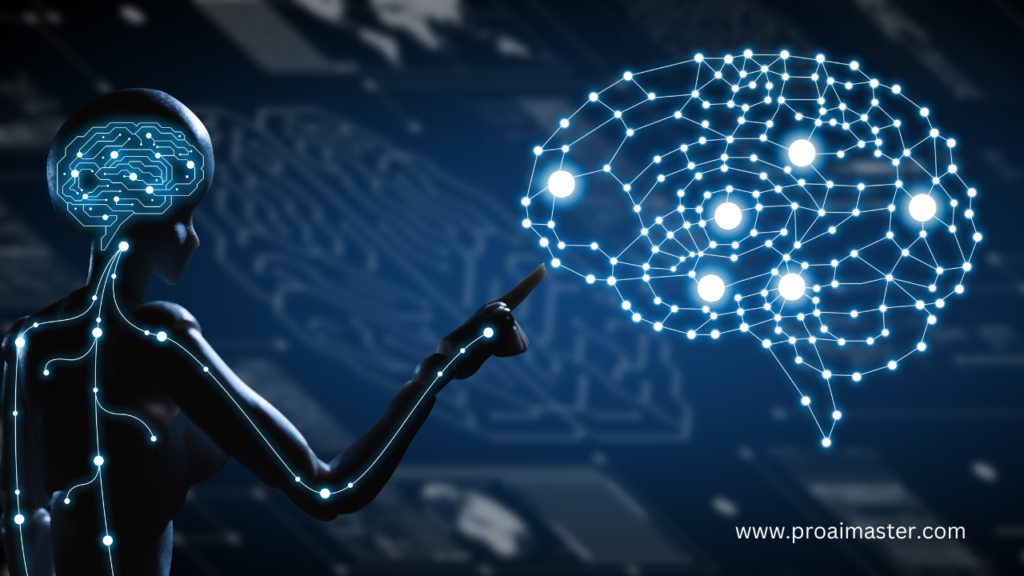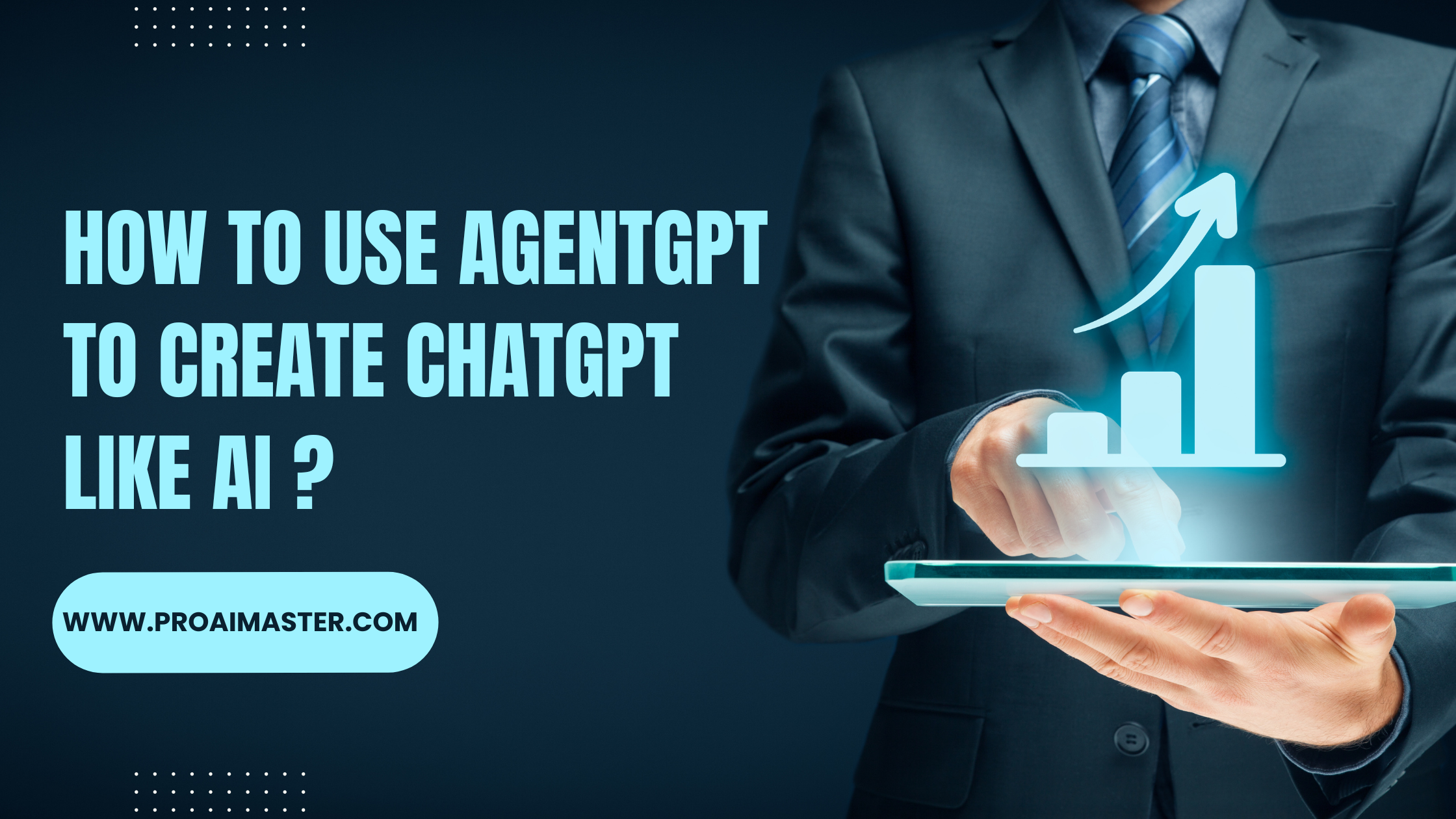How to Use AgentGPT to Create ChatGPT Like AI In 2023? In the world of artificial intelligence, natural language processing (NLP) has become a pivotal area of research and development. Chatbots, virtual assistants, and conversational agents have gained immense popularity due to their ability to interact with humans in a conversational manner.
One such breakthrough in NLP is AgentGPT, a powerful tool that can be utilized to create AI models like ChatGPT. In this article, we will explore how to harness the capabilities of AgentGPT to develop ChatGPT-like AI systems.
Understanding AgentGPT:
AgentGPT is an advanced language model developed by OpenAI, based on the GPT-3.5 architecture. It possesses remarkable abilities to understand and generate human-like text, making it an ideal choice for creating conversational AI agents.
With its vast knowledge base and contextual understanding, AgentGPT can be fine-tuned to excel in specific domains or tasks.
The Power of Conversational AI:

Conversational AI has revolutionized the way humans interact with technology. ChatGPT, an application of conversational AI, is designed to engage in natural language conversations, providing users with relevant information, support, or entertainment.
By leveraging the capabilities of AgentGPT, we can create chatbots that mimic human-like conversations, enhancing user experiences across various platforms.
Leveraging AgentGPT for ChatGPT Development:
To create a ChatGPT-like AI, we need to follow a systematic approach that incorporates the power of AgentGPT. Let’s delve into the key steps involved:
Data Collection and Preparation:

To train a ChatGPT-like model, a diverse and high-quality dataset is essential. Curating a dataset that aligns with the intended purpose of the AI system is crucial.
The dataset should encompass a wide range of conversational patterns, topics, and user interactions. Once the dataset is obtained, it must be preprocessed, ensuring the removal of irrelevant or noisy data while maintaining the conversational flow.
Fine-tuning AgentGPT:
AgentGPT serves as the base model for training the ChatGPT-like AI. By utilizing the curated dataset, we can fine-tune AgentGPT to adapt it to the conversational domain.
Fine-tuning involves exposing the model to the conversational data, allowing it to learn the nuances of natural language interactions. The focus keyword “AgentGPT to Create ChatGPT Like AI” is significant here, as it highlights the objective of this process.
Implementing Conversational Logic:
Developing a conversational agent requires incorporating appropriate logic and dialogue management. This involves defining the agent’s responses, understanding user intents, and handling various conversation flows.
By leveraging the contextual understanding of AgentGPT, we can implement an intelligent dialogue system that can provide accurate and relevant responses.
Iterative Refinement:
The development of a ChatGPT-like AI is an iterative process. It involves continuous training, testing, and refinement.
By incorporating user feedback and monitoring the performance of the system, we can identify areas for improvement and fine-tune the model accordingly. This iterative refinement ensures that the AI agent becomes more accurate, reliable, and user-friendly over time.
Use Cases and Applications:

The potential applications of ChatGPT-like AI systems are vast and diverse. Some notable use cases include:
- Customer Support: ChatGPT-like AI can be employed as virtual customer support agents, addressing customer queries and providing assistance round the clock. By integrating with existing support systems, they can enhance response times and improve customer satisfaction.
- Personalized Recommendations: Leveraging the conversational abilities of ChatGPT-like AI, personalized recommendation systems can be developed. These systems can engage users in natural language conversations to understand their preferences and offer tailored suggestions in various domains, such as e-commerce, entertainment, or travel.
- Educational Assistants: ChatGPT-like AI agents can be utilized as educational assistants, aiding students in their learning journeys. They can answer questions, explain concepts, and provide additional resources, facilitating personalized and interactive learning experiences.
Ethical Considerations:
While developing AI systems like ChatGPT, it is imperative to address ethical concerns. The focus keyword “AgentGPT to Create ChatGPT Like AI” reminds us of the responsibility to ensure that the AI model adheres to ethical guidelines.
Attention should be given to mitigating biases, promoting inclusivity, and ensuring transparency in the AI system’s functionality.
Integration with Voice Assistants:
ChatGPT-like AI models can be integrated with voice assistants, enabling users to have natural language conversations with their virtual assistants.
By combining the power of AgentGPT with voice recognition technology, users can interact with the AI agent through voice commands, further enhancing the user experience.
Multi-Turn Conversations:

AgentGPT can be leveraged to create ChatGPT-like AI models capable of handling multi-turn conversations.
These models can maintain context and coherence throughout a conversation, allowing for more dynamic and engaging interactions. The focus keyword “AgentGPT to Create ChatGPT Like AI” emphasizes the ability of the AI system to engage in sustained conversations.
Domain-Specific ChatGPT:
AgentGPT can be fine-tuned and customized to cater to specific domains or industries. By training the model on domain-specific datasets, we can create ChatGPT-like AI agents that possess specialized knowledge and vocabulary related to a particular field. This enables more accurate and relevant responses in specific contexts.
Emotion and Sentiment Analysis:
AgentGPT can be enhanced with emotion and sentiment analysis capabilities to better understand and respond to users’ emotional states.
By incorporating techniques for recognizing emotions in text, ChatGPT-like AI models can provide empathetic and appropriate responses, contributing to more human-like interactions.
Continuous Learning and Adaptation:
One of the advantages of AgentGPT-based models is their ability to continuously learn and adapt. Through reinforcement learning techniques and exposure to real-world conversations, ChatGPT-like AI systems can improve over time.
This ongoing learning process allows the AI agent to stay up-to-date with the latest information and user preferences.
Security and Privacy Considerations:
Developing ChatGPT-like AI systems requires careful consideration of security and privacy concerns.
Measures should be implemented to protect user data and ensure secure communication. Additionally, ethical guidelines must be followed to prevent the misuse of the AI system and maintain user trust.
Deployment and Scalability:

AgentGPT-based ChatGPT models can be deployed on various platforms, including websites, mobile applications, and messaging services.
The scalability of these models allows them to handle large volumes of user interactions simultaneously, providing seamless experiences even during peak usage periods.
Integration with Knowledge Bases:
To enhance the knowledge and capabilities of ChatGPT-like AI systems, they can be integrated with external knowledge bases or APIs.
This integration enables the AI agent to access and retrieve information from reliable sources, expanding its knowledge and improving the accuracy of responses.
Language Support and Localization:

AgentGPT can be trained on multilingual datasets, enabling the creation of ChatGPT-like AI models that support multiple languages.
Localization efforts can be employed to adapt the AI system to specific cultural contexts, ensuring that it understands and responds appropriately in different linguistic and cultural settings.
Continuous Improvement and User Feedback:
To create a robust ChatGPT-like AI, user feedback and engagement are crucial. Encouraging users to provide feedback on the system’s responses, accuracy, and overall performance can help identify areas for improvement.
This iterative process of collecting feedback and making adjustments ensures that the AI agent evolves and meets user expectations over time.
Conclusion:
AgentGPT’s powerful capabilities provide an exceptional foundation for creating conversational AI systems like ChatGPT. By harnessing the potential of AgentGPT, we can develop chatbots and virtual assistants that simulate human-like conversations, revolutionizing user experiences across various domains.
The focus keyword “AgentGPT to Create ChatGPT Like AI” encapsulates the essence of this transformative process, bringing the possibilities of conversational AI closer to reality.
FAQs
What is AgentGPT?
AgentGPT is an advanced language model developed by OpenAI, based on the GPT-3.5 architecture. It possesses the ability to understand and generate human-like text, making it suitable for creating conversational AI agents like ChatGPT.
What is ChatGPT?
ChatGPT is an application of conversational AI that allows users to engage in natural language conversations with AI agents. It can provide information, support, or entertainment in a conversational manner.
How can AgentGPT be used to create ChatGPT-like AI?
AgentGPT serves as the base model for training a ChatGPT-like AI system. By fine-tuning AgentGPT with a curated dataset of conversational data, implementing conversational logic, and iteratively refining the model, we can create an AI agent that mimics human-like conversations.
What is the importance of the focus keyword “AgentGPT to Create ChatGPT Like AI”?
The focus keyword highlights the objective of using AgentGPT to develop ChatGPT-like AI systems. It emphasizes the process of leveraging AgentGPT’s capabilities to create conversational AI agents that exhibit similar functionality and behavior to ChatGPT.
What are the potential applications of ChatGPT-like AI systems?
ChatGPT-like AI systems can be used in various applications, including customer support, personalized recommendations, educational assistance, voice assistants, and more. Their versatility allows them to enhance user experiences across different domains.
How can ChatGPT-like AI models handle multi-turn conversations?
By leveraging the contextual understanding and memory capabilities of AgentGPT, ChatGPT-like AI models can maintain coherence and context throughout multi-turn conversations, providing more dynamic and engaging interactions.
What ethical considerations should be taken into account when developing ChatGPT-like AI systems?
Ethical considerations in AI development include mitigating biases, promoting inclusivity, ensuring transparency, and respecting privacy and security. These considerations should guide the development and deployment of ChatGPT-like AI models.
How can ChatGPT-like AI models be continuously improved?
Continuous improvement can be achieved by collecting user feedback, monitoring performance, and making iterative adjustments to the AI model. Incorporating user feedback and employing reinforcement learning techniques can help the AI system adapt and improve over time.
Can ChatGPT-like AI models support multiple languages?
Yes, by training AgentGPT on multilingual datasets, ChatGPT-like AI models can be developed to support multiple languages. Localization efforts can also be employed to adapt the AI system to specific cultural contexts and linguistic nuances.
How can ChatGPT-like AI models integrate with external knowledge bases?
Integration with external knowledge bases or APIs can enhance the knowledge and capabilities of ChatGPT-like AI models. By accessing reliable sources of information, the AI agent can provide accurate and up-to-date responses to user queries.
What platforms can ChatGPT-like AI models be deployed on?
ChatGPT-like AI models can be deployed on various platforms, including websites, mobile applications, messaging services, and voice assistants. Their scalability allows them to handle large volumes of user interactions simultaneously.
How can user feedback contribute to the development of ChatGPT-like AI systems?
User feedback plays a vital role in identifying areas for improvement in the AI system’s responses, accuracy, and overall performance. Incorporating user feedback enables iterative refinement and ensures that the AI agent evolves to meet user expectations.


